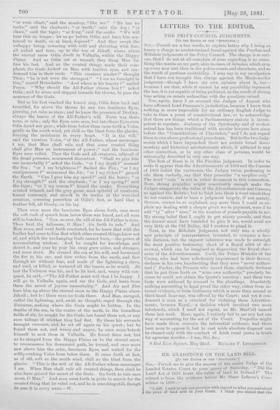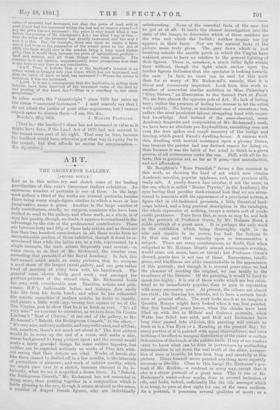MR. GLADSTONE ON THE LAND BILL. [TO TRH EDITOR OF
THE n SPROTATOR.1 Std,—Permit me to give the answer of the senior Judge of the Landed Estates Court to your query of Saturday,—" Did the Laud Act of 1870 lower the value of land in Ireland P" The extract is from the evidence before Mr. Shaw Lefevre`a Com- mittee in 1878 :— " 5,446. I wish to ask one question with regard to what you said about the price of land sold in your Court. I think you stated that the value of property had increased, but that the price of land sold in your Court had not increased within the last ten or twenty years P—I say the price has not increased; the price is very much what it was before the passing of Mr. Gladstone's Act ; but what I say is this,— that the value of the property has greatly increased, and the way I test it is this. Say, for example, there was upon an estate a farm Which had been in the possession of the owner prior to the Act of 1870, the farm would now in the market bring a very much higher price than it would then, because the price of agricultural produce— beef and mutton, and all those things—has risen greatly. The aountry is, in my opinion, unquestionably more prosperous now than it has been at any time in my recollection.
"5,417. Then, it follows that it is the landlord's interest in an estate which is brought into your Court which has not increased, and that the value of land, as land, has increased P—Where the estate is tenanted, it has not increased.
"5,418. Is it not a consequence that the landlords, in selling their Interest, have been deprived of the increased value of the land by the passing of the Land Act P—That is a corollary to the other proposition."
In other words, the " tenant-right " since 1870 has eaten up the entire " unearned increment." I need scarcely say that I do not admit the justice of your other arguments, but I cannot 'expect space to discuss them.—I am, Sir, &c.,
[That is,—the landlord's share has not increased in value as it .might have done, if the Land Act of 1870 had not secured to the tenant some part of his right. That may be true, because the landlord would have otherwise got what was iu equity due to the tenant; but that affords no excuse for compensation.— En. Spectator.]



































 Previous page
Previous page